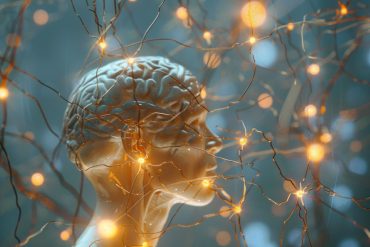Summary: Listening to music may help boost the beneficial effects of medicine while helping to reduce some of the side effects. Cancer patients who listened to their favorite music while experiencing chemotherapy-related nausea reported a decrease in nausea severity and stress.
Source: University of Michigan
While listening to a favorite song is a known mood booster, researchers at Michigan State University have discovered that music-listening interventions also can make medicines more effective.
“Music-listening interventions are like over-the-counter medications,” said Jason Kiernan, an assistant professor in the College of Nursing. “You don’t need a doctor to prescribe them.”
While previous research studies have used music-listening interventions as a tool to treat pain and anxiety, Kiernan took a novel approach by studying the effects of music-listening interventions on chemotherapy-induced nausea.
“Pain and anxiety are both neurological phenomena and are interpreted in the brain as a state,” Kiernan said. “Chemotherapy-induced nausea is not a stomach condition; it is a neurological one.”
The small pilot study included 12 patients undergoing chemotherapy treatment who agreed to listen to their favorite music for 30 minutes each time they needed to take their as-needed anti-nausea medication.
They repeated the music intervention anytime nausea occurred over the five days beyond their chemotherapy treatment. The patients in the study provided a total of 64 events.
“When we listen to music, our brains fire all kinds of neurons,” Kiernan said.

While Kiernan did see a reduction in the ratings of patients’ nausea severity and their distress (how much it bothered them to be nauseous), he cautions that it is difficult to isolate whether it was the gradual release of the medication doing its job or the increased benefit of the music.
For future studies, Kiernan is drawing inspiration from another previously published study that measured the amount of serotonin, a neurotransmitter, that was released by platelets in the blood after listening to unpleasant and pleasant music.
“Serotonin is the major neurotransmitter that causes chemotherapy-induced nausea,” Kiernan said. “Cancer patients take medications to block serotonin’s effects.”
During that previous study, researchers found that patients who listened to pleasant music experienced the lowest levels of serotonin release, indicating that the serotonin stayed in the blood platelets and was not released to circulate throughout the body. Results also showed that after listening to music they found unpleasant, patients experienced greater stress and increased levels of serotonin release.
“This was intriguing because it provides a neurochemical explanation and a possible way to measure serotonin and the blood platelet release of serotonin in my study,” Kiernan said. “In 10 to 20 years, wouldn’t it be neat if you could use a nonpharmacological intervention like listening to 10 minutes of your favorite music to complement a medicine?”
About this music and neuroscience research news
Author: Kaylie Crowe
Source: Michigan State University
Contact: Kaylie Crowe – Michigan State University
Image: The image is in the public domain
Original Research: Closed access.
“Mitigation of Chemotherapy-Induced Nausea Using Adjunct Music Listening: A Pilot Study” by Jason Kiernan et al. Clinical Nursing Research
Abstract
Mitigation of Chemotherapy-Induced Nausea Using Adjunct Music Listening: A Pilot Study
The persistence of chemotherapy-induced nausea (CIN) underscores the need to consider nonpharmacologic treatments such as music listening as adjunct interventions.
This pilot study investigated the feasibility and overall effects of a 30-minute adjunct music listening intervention in 12 patients experiencing CIN. Music listening was started at the time participants took their as-needed antiemetic medication, and it was repeated as needed during the 5 days after chemotherapy.
Data for 66 music listening engagements were collected. A significant reduction of nausea severity (t = 10.97, p < .001) and distress (t = 9.86, p < .001) was noted overall, as well as significant reductions when examining the acute and delayed phases of nausea individually.
Qualitative data on study feasibility demonstrated the intervention was well received by participants and held minimal operational difficulty. Investigator feasibility data suggested good understanding of data collection tools. Improvements to the study design have been collected and will form the basis of the future randomized controlled trial.







